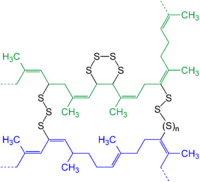
Photo from wikipedia
Abstract Polymeric nanofibers have attracted research attention in recent years for various biomedical applications, including tissue engineering and regenerative medicine. In this work, a series of novel nanofibers based on… Click to show full abstract
Abstract Polymeric nanofibers have attracted research attention in recent years for various biomedical applications, including tissue engineering and regenerative medicine. In this work, a series of novel nanofibers based on PMS/PLA with different polymeric weight ratios of 3:2, 1:1, and 2:3 were successfully fabricated by the electrospinning technique. The resultant nanofibers were then cross-linked using high-temperature vacuum oven and sterilized via various methods. The mechanical properties such as elasticity and stiffness, degradation behavior, and cytocompatibility were studied in order to investigate the potential of PMS/PLA nanofibers for tissue engineering applications. The results revealed that by increasing the cross-linking temperature up to 90 °C, PMS/PLA nanofibers maintained their nanostructured features even though there were slight changes in the morphology and diameters of the fibers. The average ultimate tensile stress (σUTS) and Young modulus (E) of the PMS/PLA nanofibers significantly increased with cross-linking temperatures ranging from 2.51 to 3.88 MPa to 6.08–11.07 MPa and from 47.88 to 57.10 MPa to 101.37–142.31 MPa, respectively. The degradation rate of PMS/PLA nanofibers significantly decreased after the cross-linking process. The results also revealed that cross-linked PMS/PLA nanofibers could be safely sterilized without severe damages to fibrous microstructures. The PMS/PLA nanofibers revealed no significant cellular toxicity in in vitro cell culture models. The outcomes suggest that PMS/PLA nanofibers could be effectively fabricated with a range of mechanical properties and degradation rates for tissue engineering applications.
Journal Title: European Polymer Journal
Year Published: 2020
Link to full text (if available)
Share on Social Media: Sign Up to like & get
recommendations!